
5 Books Making News This Week: Widows, War, and Weight
Sarah Perry, Mark Bowden, Roxane Gay, and More
The wave of summer reading lists is cresting—lots of options from the Washington Post, Iowa Public Radio (with help from Prairie Lights Books’ Jan Weissmiller and Paul Ingram and Kathy Magruder from Pageturners Book Store in Indianola), the Boston Globe, Wired, the New York Times’s Janet Maslin, Thrillist, the Denver Post, and more.
Women’s National Book Association Awards go to Louise Erdrich and Dr. Carla Hayden. California Book Awards go to Michael Chabon (Moonglow) for fiction, Andrés Reséndez (The Other Slavery) for nonfiction, Aja Couchois Duncan (Restless Continent) for poetry. Mark Bowden uses the battle of Hue as a touchstone to define the Vietnam War, Sarah Perry’s new historical novel is “a novel of almost insolent ambition,” Maile Meloy’s first novel for adults in a decade pulls in mixed reviews, Barbara Browning’s latest is “utterly thrilling to watch.” And more about the “raw beauty” of Roxane Gay’s memoir.
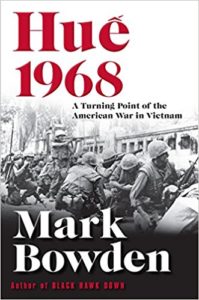
Mark Bowden, Hue 1968
Bowden (Black Hawk Down) uses the bloodiest battle of the Vietnam War as a touchstone to gather testimony from dozens of participants on both sides, in a book that defines a historic era in American history.
Dan Rather is a fan: “I’m reading Mark Bowden’s new book, Hue 1968: A Turning Point of the American War in Vietnam,” he tweets. “It’s superb.”
Karl Marlantes (Wall Street Journal) calls Hue 1968 “an extraordinary feat of journalism.”
Steve Donoghue (Christian Science Monitor) writes, “Bowden tells this story with a power and a wealth of detail that no previous history of this offensive has approached—this is another instantly-recognizable classic of military history.”
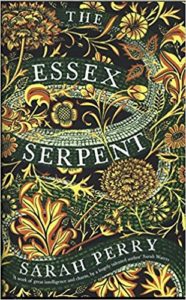
Sarah Perry, The Essex Serpent
Perry’s new historical novel was longlisted for the Bailey’s Women’s Prize for Fiction and won Overall Book of the Year and Fiction Book of the Year at the British Book Awards 2017. It follows a nineteenth-century woman who, when widowed, follows her passion for paleontology by joining in a search for dinosaur bones.
Jennifer Senior (New York Times) calls the Essex Serpent “a novel of almost insolent ambition—lush and fantastical, a wild Eden behind a garden gate.” She continues: “Set in the Victorian era, it’s part ghost story and part natural history lesson, part romance and part feminist parable. It’s wonderfully dense and serenely self-assured. I found it so transporting that 48 hours after completing it, I was still resentful to be back home.”
“It can’t be an accident that Perry placed her story about collective panic in Essex,” writes Annalisa Quinn (NPR). “Not only was there really a mythical winged serpent that terrorized locals there in the 17th century, but it was the location of the notorious Essex witch trials. The self-styled Witchfinder General, Matthew Hopkins, traveled through the county, cutting women to see if they bled—if not, they were witches. Perry is good at catching the special collective dread that enflames communities—the fear that something sinister is stirring, waiting just out of sight. That gives a special magnetism to a story that needed none.”
In his Totally Hip Book Review, Ron Charles (Washington Post) calls it “a delightful historical novel” about “a southern nephew of the Loch Ness Monster.” And more: “It’s a romantic comedy, it’s a murder mystery, it’s a novel of ideas.”
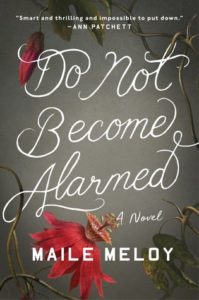
Maile Meloy, Do Not Become Alarmed
Meloy’s first adult novel in ten years follows two couples on a holiday cruise down the Pacific Coast of Mexico and Central America. The nightmare begins when their children disappear during an excursion. Some critics are admiring; another, not so much.
“Thrillers generally work this way, roping in the ever-reliable opposition of Good and Evil: The bad guys set the plot in motion, and then the good guys put the world back in order again,” writes Laura Miller (Slate). “This is not, however, how Meloy tells it. Her stories are intersections of happenstance and character. If this man had not decided to go golfing because it seemed like the manly thing to do . . . If that tire had not blown out, threatening to ruin Liv’s perfect vacation plans . . . If the sun had not been so hot that day and the mothers so lulled by their guide’s expertise . . . If the children had not swum ashore at this particular spot . . . If a paper bag had not fallen out of a child’s pocket . . . Each of these seemingly inconsequential, accidental incidents changes the course of fate, often in momentous ways. Do Not Become Alarmed proves that you don’t need hackneyed thriller devices to generate powerful momentum and suspense.”
Maureen Corrigan (NPR) concludes, “Meloy is such a deft writer that she keeps the adventure plot whizzing along even as she deepens our sense of the characters and the unfamiliar culture they have to navigate. You may (mistakenly) think that you don’t want to enter the nightmare world of this novel, but Meloy makes you realize what a luxury it is to have that choice.”
Charles Finch (Washington Post) is the naysayer in the group: “[T]he book is essentially a write-off. To begin with, it’s a thriller without thrills. The parents’ pursuit of their children is hysterical but static, mistaking emotion for action, while the children’s experience itself is implausible and dull . . . The drug dealers are outlandishly stupid characters. Liv, Nora and their families are more carefully wrought, but they’re in too farfetched a situation to achieve escape velocity from the novel they’re stuck in. Never do they feel, even briefly, as though they could exist before the book’s first page or after its last.”
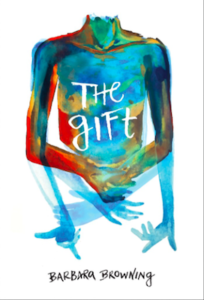
Barbara Browning, The Gift
Browning, a performance artist, professor, novelist, and maker of ukelele cover tunes, seduces with her latest “autofiction.”
Browning’s novels are “improbably warm and funny, animated by friendships, flirtations, and love affairs, many of which are pursued doggedly online—in chat rooms, on Facebook, through e-mail exchanges. It’s tempting to compare her to popular writers of ‘autofiction,’ such as Chris Kraus, Sheila Heti, and Ben Lerner—all of whom she mentions in her work—but Browning exaggerates the genre to particularly postmodern, batty, and charming extremes,” writes Alice Gregory (The New Yorker).
Jenny Hendrix (New York Times Book Review) notes, “Browning . . . relishes the creation of . . . unusual, erotically charged encounters throughout daily life: email spam, performance art, YouTube videos and academic panels each provide opportunities in The Gift that she seizes with zest. The result is a smart, funny, heartbreaking and often sexy delight of a novel that presses hard against the boundaries of where literary and artistic performances begin and end.”
The starred Kirkus Review concludes, “Browning is working at the edges of her craft, and it’s utterly thrilling to watch. A delicious love letter to readers and co-conspirators everywhere.”
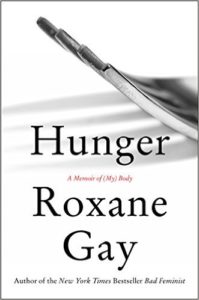
Roxane Gay, Hunger
Gay’s memoir of her rape at age 12 and the post-traumatic weight gain continues to draw accolades. “I live in Indiana part-time, and I’m from the Midwest, and I assure you that there are many fat people in the world, and their stories deserve to be told in a way that’s not as exploitative as My 600-lb Life, which I hate-watch,” Gay tells Janelle Okwodu (Vogue).
Adrienne Green (The Atlantic) writes:
She relies on the repetitive descriptions of her rape and her brokenness in a way that might in other circumstances seem gratuitous, but which in Hunger serves to give readers some emotional insight into the unrelenting nature of trauma.
Woven into this repetition is a ruminative preoccupation with strength, in all its varieties. In a 2012 article for The Rumpus, Gay wrote that she is “always interested in the representations of strength in women … and what it costs for a woman to be strong. All too often, representations of a woman’s strength overlook that cost.” What makes Hunger emotionally resonant is her ability to make the cost of survival—her moving forward from the rape and the challenge of her size—so transparent.
Ann Levin (Associated Press) points out the cultural criticism woven into Gay’s memoir:
“This is not a weight-loss memoir,” she warns readers at the outset. “I don’t have any powerful insight into what it takes to overcome an unruly body and unruly appetites.” What she has is insight aplenty about culture and society, particularly the medical establishment, which she blasts for treating fatness as pathological, and the fashion/entertainment industry, which rakes in big bucks by making women feel insecure about their looks.
“It is a thing of raw beauty,” writes Charisse Jones (USA Today).
Jane Ciabattari
Jane Ciabattari, author of the short story collection Stealing the Fire, is a former National Book Critics Circle president (and current NBCC vice president/events), and a member of the Writers Grotto. Her reviews, interviews and cultural criticism have appeared in NPR, BBC Culture, the New York Times Book Review, the Guardian, Bookforum, Paris Review, the Washington Post, Boston Globe, and the Los Angeles Times, among other publications.



















